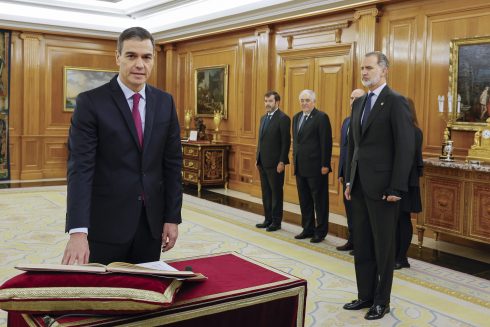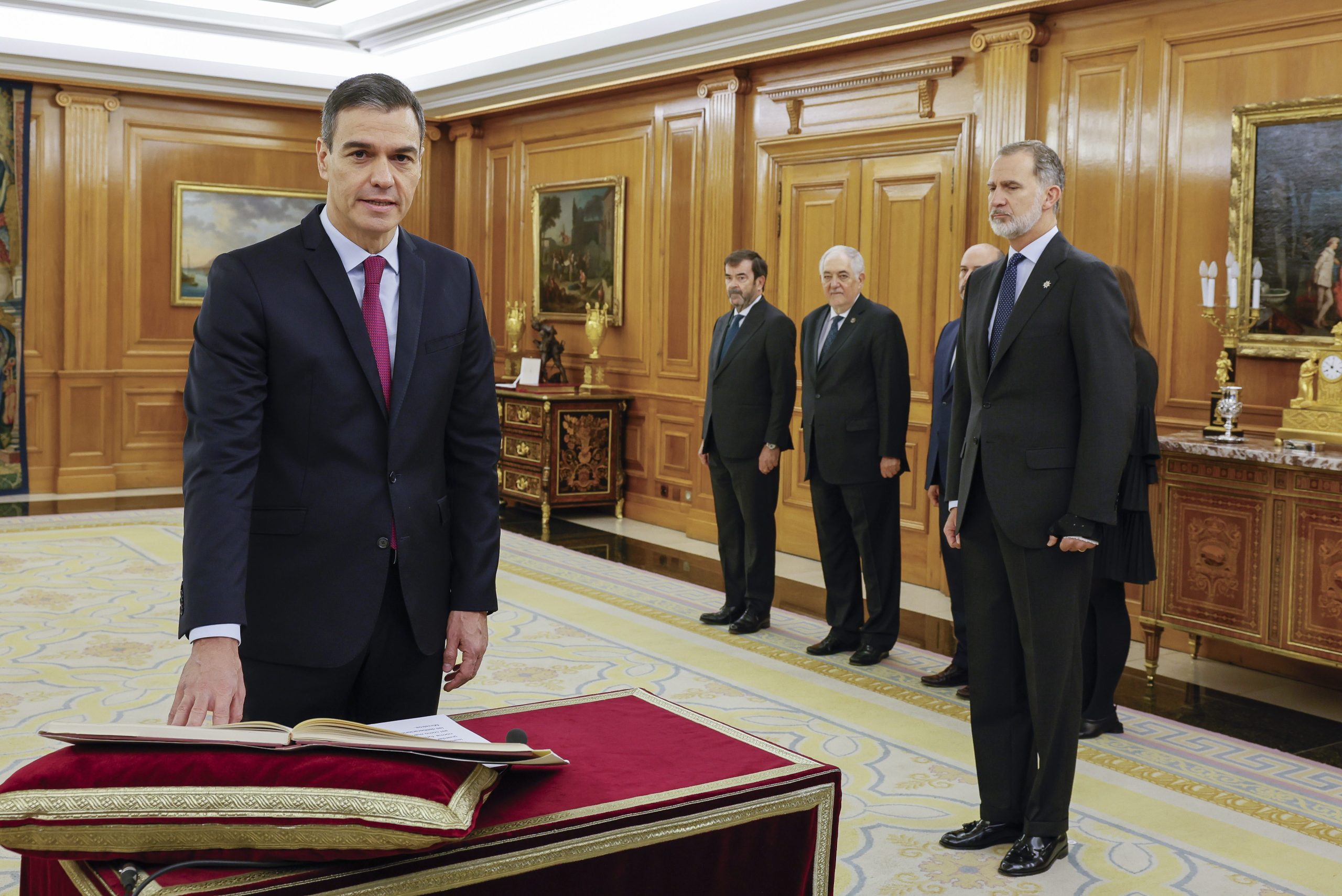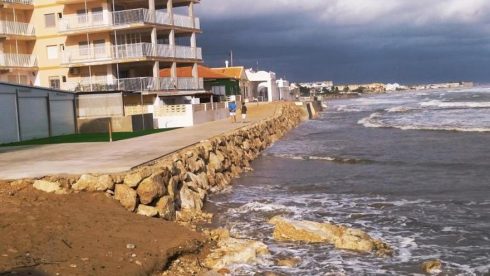SOCIALIST PARTY leader Pedro Sanchez was sworn in as prime minister on Friday morning, the day after he won an investiture vote in Congress that will see him serve a fresh term in office.
The ceremony took place in La Zarzuela palace in the presence of Spain’s King Felipe VI. Sanchez was sworn in before a copy of Spain’s Constitution but without any religious symbols present.
“I swear, on my conscience and honour, to faithfully fulfil the obligations of the office of prime minister of the government with loyalty to the king and to keep and enforce the Constitution as the fundamental rule of the state, as well as to keep the deliberations of the Cabinet secret,” Sanchez said during the ceremony.
The 51-year-old politician won the first of two possible votes during his investiture debate yesterday, securing an absolute majority of 179 ballots in the 350-seat chamber.
He did so thanks to the support not just of his own party, but also new leftist alliance Sumar, which will be his coalition partner, the Catalan Republican Left (ERC), Together for Catalunya, EH Bildu, the Basque Nationalist Party (PNV), the Galician Nationalist Bloc (BNG), and the Canarian Coalition.
The vote brought an end to nearly four months of political stalemate since the inconclusive July 23 general election.
Voting against his investiture were the conservative Popular Party (PNV), far-right Vox and the Navarrese People’s Union (UPN).
Sanchez has been prime minister since June 2018, after he won a vote of no-confidence he filed against then-leader Mariano Rajoy of the conservative Popular Party.
After the inconclusive 2019 general election, he managed to form a minority government in 2020 in coalition with leftist Unidas Podemos, securing the support of smaller groups for his investiture and to pass legislation.
This was the feat that he repeated this week, although this time around his alliances have been far more controversial.
In order to secure a majority, the Socialist Party had to reach deals with separatist parties ERC and Together for Catalunya, which include the pardoning of debt for the northeastern region, a roadmap for negotiations on the future of the region, and most controversially, an amnesty for anyone who was involved in the Catalan independence drive over the last decade.

This will potentially include Carles Puigdemont of Together for Catalunya, a fugitive from justice who fled Spain in 2017 in the wake of the independence drive to avoid arrest, and who has been living in Brussels ever since.
Moving forward, the new government may find it more difficult to pass new laws and implement leftist policies, given that it will have to depend on the votes of the PNV and Together for Catalunya, which are both on the right wing of the Spanish political spectrum.
The potential trouble ahead was clear to see at this week’s investiture debate. Together for Catalunya leader in Congress, Miriam Nogueras, stated during her interventions that “if there is no progress” in their objectives for the region, they “will not approve any initiative presented by your government.”
She also made clear that her party’s “commitment to [Catalan] independence is unwavering”. Sanchez has repeatedly ruled out a referendum on independence in Catalunya on the basis that such a plebiscite is not possible under the Constitution.
He has, however, opted for bilateral talks and a political approach to improving relations between the central government and the region.
The most immediate task for Sanchez, however, is to choose his ministers. So far the Socialists are keeping tight-lipped about who will be appointed to which role, but the leader of Sumar, Yolanda Diaz, is expected to repeat her current portfolios of deputy prime minister and labour minister.
Iñigo Errejon, the leader of the Mas Pais party, which makes up the Sumar alliance, told state broadcaster TVE on Friday that negotiations on the new Cabinet were being held directly between Sanchez and Diaz.
However, the two jobs of the two current ministers from the leftist Podemos party, caretaker social rights minister Ione Belarra and caretaker Equality Minister Irene Montero, could be at risk. (Podemos was also absorbed by Sumar ahead of the July 23 snap general election.)
Podemos general secretary Ione Belarra denounced on Thursday a ‘possible veto’ against the party by both Sanchez and Diaz, and claimed that all five of the party’s deputies could be left out of the new Cabinet.
She also revealed that she had not spoken to Diaz since July.
Podemos caused a major headache for the Socialist Party-led government just over a year ago, when its star legislation, the ‘only yes means yes’ consent law, inadvertently saw convicted sex offenders’ sentences cut and in some cases early release from prison.
The issue strained relations between the two parties, in particular after the Socialists opted to amend the legislation to close the loophole without the agreement of Podemos.
Read more:
- Pedro Sanchez voted back in as Spain’s prime minister after securing controversial support of Catalan separatists
- Sex dolls as a form of protest: Demonstrations in Madrid against Catalan amnesty take a surreal turn
- Why are people across Spain protesting against Pedro Sanchez’s Catalan amnesty deal?
Click here to read more News from The Olive Press.








